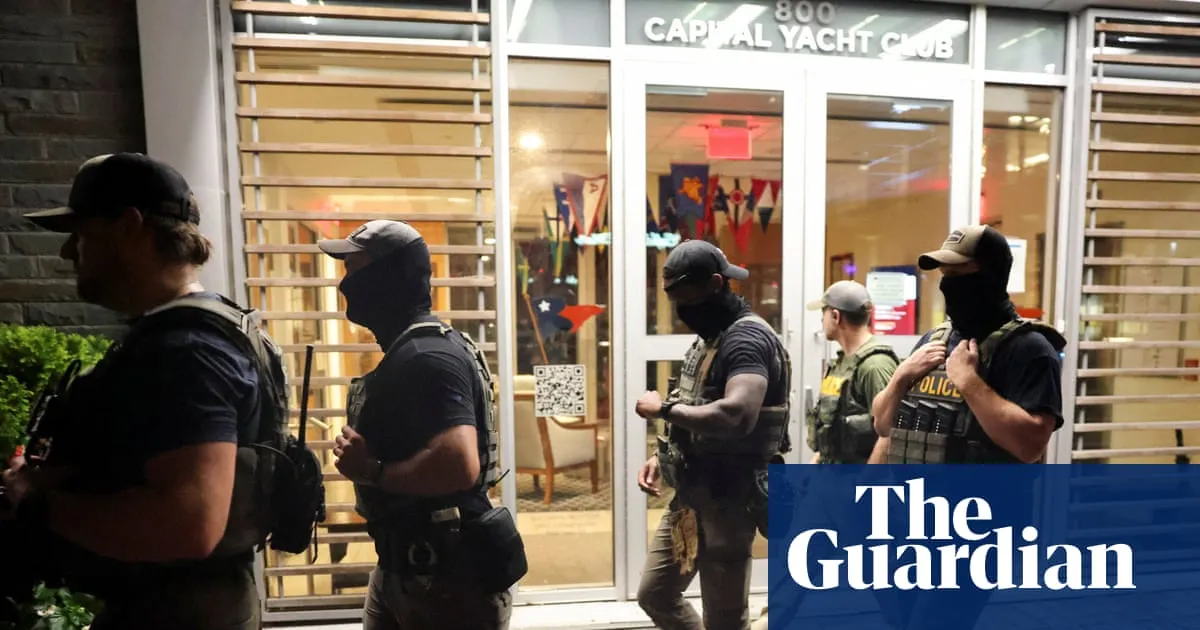
On a bustling Thursday morning, Washington DC's only Home Depot was filled with contractors and customers. However, the usual presence of Hispanic day laborers waiting for work beneath the sparse trees in the parking lot was conspicuously absent. This sudden change followed a dramatic raid by masked federal agents just two days prior, during which numerous arrests were made, shocking onlookers who captured the events on social media.
Juwan Brooks, an employee at Home Depot, described the chaotic scene as federal agents indiscriminately apprehended individuals who appeared Hispanic. “They don’t ask no questions,” Brooks recounted, emphasizing the indiscriminate nature of the arrests. Bystanders observed agents detaining people who were merely walking across the parking lot, exiting their vehicles, or even sleeping in their cars. The swift action left behind empty work trucks that were eventually towed away, raising concerns about the fate of those apprehended.
Reflecting on the situation, Brooks expressed his dismay at witnessing such aggressive tactics in reality. “It was cool when Trump was saying it, but to actually see it firsthand? I didn’t like it,” he stated, adding that the day laborers “are not bad people.” He pondered the implications for the children of those men taken away during the raid.
Just four days after President Trump ordered federal agents and the national guard to take to the streets of Washington DC in response to a supposed crime wave—one that local leaders argue does not exist—the residents have begun adjusting to the sight of armed groups patrolling their neighborhoods. Beyond the apparent immigration arrests at Home Depot, Brooks noted that this was the second raid he was aware of since Trump took office.
Since the federal deployment began, the city has seen agents setting up roadblocks at major intersections and patrolling various neighborhoods. Trump, utilizing a rarely invoked clause in district law, has taken control of the Metropolitan Police Department (MPD) for a 30-day period and aims to gain Congressional approval for long-term federal oversight.
The impact of this federal intervention on public safety remains uncertain. Last year, violent crime rates in Washington DC fell to a 30-year low, though crime remains more prevalent in the city compared to others with similar populations. Since the federal deployment was formalized on Monday, two additional homicides have been recorded, raising the total for the year to 101.
Kevin Cataldo, a neighborhood commissioner representing an area just north of downtown where the year’s 100th homicide occurred, voiced concerns about the overreach of federal authority. “I just feel like it’s too much federal overreach. I think it’s unnecessary, and I think our MPD does a great job,” he stated.
The White House has announced that 800 national guard troops will be on the ground in the city, accompanied by hundreds of federal officers from various agencies, including the Drug Enforcement Administration, Border Patrol, and the FBI. On a recent Thursday afternoon, unarmed troops were seen mingling among tourists at the Lincoln Memorial, an area typically known for its low crime rate. Kevin Davis, a 21-year army veteran visiting from El Paso, Texas, remarked, “What they are doing right now? It’s just a show of force. I did that in Iraq. When people see the uniform, they act differently.”
Federal agents have increasingly appeared in neighborhoods across the predominantly Democratic city since the weekend. Tensions escalated on Sunday night when a Justice Department employee was arrested for assaulting a Customs and Border Protection official. The following nights saw agents setting up roadblocks and pulling over vehicles on major roads, prompting protests from local residents.
In Columbia Heights, a neighborhood with the city’s largest Hispanic population, locals confronted police and federal agents who began stopping cars. A local shop manager reported that residents attempted to express their concerns, with some shouting, “This is a free country,” and questioning why federal presence was making the community feel unsafe.
Georgetown University undergraduate Owen Simon noted an increased federal presence around the campus, expressing concern for foreign students. He articulated, “No one wants to walk around knowing that anyone could be scooped up out of the street at any moment.” Simon believes that the Trump administration's actions are less about tackling crime and more focused on optics.
Back at Home Depot, Brooks echoed similar sentiments regarding the federal approach in his neighborhood, Congress Heights. He acknowledged that while crime is an issue, it often stems from youth rather than the hardworking residents trying to improve their lives. “You got working people living in the neighborhood, going to the store, getting picked up because of 16-, 17-year-olds,” he said, questioning the logic behind targeting those striving for a better future. Over the weekend, he witnessed an unusual number of federal agents patrolling his neighborhood, leading him to conclude, “It’s more of an intimidation tactic.”
Joseph Gedeon contributed reporting to this article.